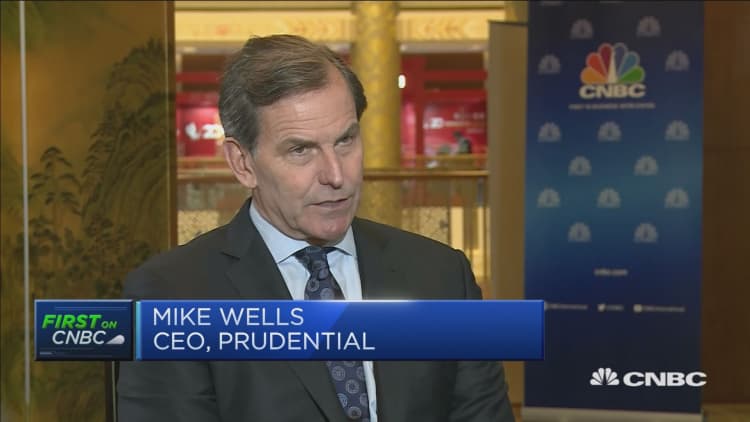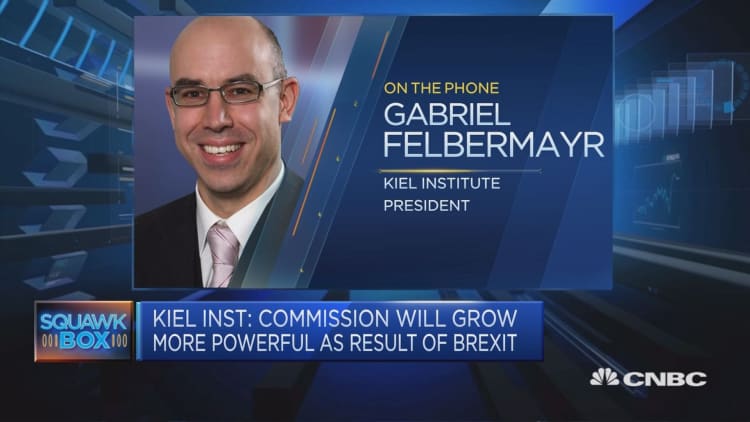As if the ultimate direction of Brexit was not enough for Brits to contend with, now speculation is mounting that British Prime Minister Theresa May could resign — throwing the whole process into further doubt.
May met her closest ministers Monday morning and is expected to update the House of Commons on her Brexit strategy in the afternoon, amid continuing turbulence and confusion over the U.K.'s departure from the EU.
There have been reports in various U.K. media outlets that May is facing another mutiny within her own party.
On Sunday, May met with influential Brexiteers in her Conservative Party and, according to some reports, gave her word that she would give a date for her resignation in return for their support in a third possible vote on her Brexit deal, formally known as the "Withdrawal Agreement." Whether a third vote will even take place this week remains up in the air as it's doubtful that there's enough support to pass the deal.
Downing Street refused to comment on speculation over May's political future although pressure is rising on her both inside euroskeptic circles and outside. The widely-read tabloid newspaper The Sun, which has previously supported May, used its front page on Monday to urge the prime minister to quit, with the headline "Time's Up, Theresa."
The paper said while she had "shown courage" in office, she was facing "fresh pressure" and that "the PM is being urged to vow she'll resign in a last-ditch bid to convince Brexiteers they should back her deal in the Commons this week."
Several senior ministers said Monday they do not want May to resign, casting doubts over the rumored coup. Nonetheless, her position remains "fragile," according to Constantine Fraser, a European political research analyst at TS Lombard.
"Despite her Cabinet seemingly abandoning an attempt at a coup over the weekend, May's position is still extremely fragile," he said in comments emailed to CNBC.
"For now, what she has in her favor is that time is short, there is little agreement in the (Conservative) party as to who should replace her, and it not obvious what difference a change of prime minister would make to the country's immediate predicament. For her rivals, she also makes a convenient scapegoat for the failings of the Withdrawal Agreement."

Fraser added however that "it looks a lot like her days will be numbered" as soon as the U.K. has some breathing space. Some reports suggest that David Lidington, the prime minister's deputy, could be in the running for the leadership if May is forced out. Nonetheless, it's likely to turn into a battle between pro-Remain and pro-Brexit politicians within the Conservative Party.
J.P. Morgan economist Malcolm Barr said Monday that it's uncertain who could fill May's shoes.
"Although the weekend's press contained much reporting of Cabinet plots to remove her, the choice of successor is incredibly divisive, and it is difficult to establish any kind of consensus among Conservative MPs about how to proceed," he said in a note.
More votes coming
On Monday evening, MPs are due to debate and vote on the next steps to be taken in the Brexit process and ng on a series of amendments to Brexit, one of which (tabled by opposition Labour leader Jeremy Corbyn) calls for parliament to be given time this week to hold "indicative votes" which allow MPs to vote on their preferred courses of action with Brexit.
The series of indicative votes that could be on offer include no deal, May's deal, holding a second referendum, revoking Article 50 and Britain remaining within a customs union with the EU.
This would essentially mean that Parliament takes control of Brexit process, strategists at Deutsche Bank noted on Monday.
"MPs (Members of Parliament) will debate Brexit (Monday and a series of amendments are likely coming, which will surely include a vote on indicative votes. The U.K. weekend press was rife with speculation that Mrs May was close to being toppled with a caretaker PM expected to oversee Brexit negotiations. However, as Sunday progressed the names discussed as potential caretakers distanced themselves from the process and we're no further along on knowing whether Mrs May will survive the week," Jim Reid, Craig Nicol and Quinn Brody said in a note.

Twists and turns
It's not only the British Parliament that is divided over Brexit with the public still largely split over whether to leave or remain. At the weekend, an estimated 1 million people marched in London to demand a second referendum. An online petition demanding that Article 50 (which set in motion the departure process) is revoked and that Britain remains in the EU has also reached nearly 5.5 million signatures.
The latest uncertainty over Brexit is nothing new and comes after weeks and months of twists and turns in negotiations.
In the last few months, May has survived two confidence votes and two parliamentary defeats on her Brexit deal. The U.K. was meant to leave the EU on March 29 but as no deal has been approved by U.K. lawmakers, May was forced to request an extension to the departure date.
The EU said Britain could have a delay until May 22 if MPs approved the Brexit deal in a potential third meaningful vote this week — or if they did not approve the deal the U.K. would be given until April 12 to "indicate a way forward."


